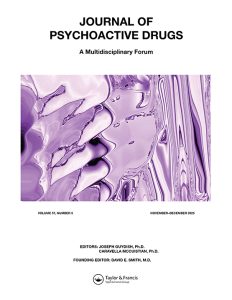 As a clinician in recovery, navigating the path to healing can be particularly complex, especially when traditional recovery methods intersect with emerging, alternative approaches. For those of us who have chosen to incorporate psychedelics into our personal recovery journeys, despite their illegal status in many states, the road is even more intricate. Balancing professional responsibilities, personal beliefs, and legal considerations creates a unique set of challenges that require careful thought, integrity, and courage.
As a clinician in recovery, navigating the path to healing can be particularly complex, especially when traditional recovery methods intersect with emerging, alternative approaches. For those of us who have chosen to incorporate psychedelics into our personal recovery journeys, despite their illegal status in many states, the road is even more intricate. Balancing professional responsibilities, personal beliefs, and legal considerations creates a unique set of challenges that require careful thought, integrity, and courage.
Embracing a Non-Traditional Path in a Traditional Framework
Recovery in the 12-step tradition—such as that outlined in Alcoholics Anonymous (AA) or Narcotics Anonymous (NA)—often emphasizes total abstinence from all mood-altering substances. For many, this approach has been life-saving, providing structure, community, and a spiritual foundation for living free of addiction. However, the evolving landscape of mental health treatment now includes psychedelics as a potentially transformative tool for healing trauma, fostering spiritual awakening, and deepening personal insight. As clinicians, we are aware of these promising avenues and the scientific research supporting their therapeutic potential.
The Personal Conflict: Reconciling Beliefs and Practices
For those in traditional recovery who choose to explore psychedelics as part of their healing journey, a significant internal conflict can arise. How does one reconcile the tenets of abstinence with the therapeutic use of psychedelics, especially when these substances are often viewed as drugs within the recovery community?
This personal conflict is compounded by the fact that many of us, as clinicians, must also consider the ethical implications of using a substance that remains illegal in many jurisdictions. This dual identity—being both a clinician and someone in recovery—can lead to feelings of isolation and a sense of walking a lonely path. We may fear judgment or rejection from peers in both the professional and recovery communities.
The Professional Dilemma: Ethics, Legality, and Disclosure
As clinicians, we are bound by professional codes of ethics that prioritize patient safety, honesty, and adherence to legal standards. Integrating psychedelics into our personal recovery raises several ethical dilemmas:
- Confidentiality and Disclosure: How much should we disclose about our use of psychedelics to our clients, colleagues, or within our recovery community? Maintaining confidentiality about our personal lives is one thing, but the potential implications of such disclosure—both positive and negative—must be carefully weighed.
- Legal Risks: Despite growing research on their benefits, most psychedelics remain classified as illegal substances in many states and countries. Using these substances—even in a therapeutic context—places us at risk of legal consequences, which could impact our professional licenses, careers, and personal lives.
- Navigating Stigma: Psychedelic use can be heavily stigmatized, especially within traditional recovery circles. The stigma can lead to feelings of shame or the fear of being ostracized, making it harder to find a supportive community that understands and respects our choices. As clinicians, we may also worry about how our personal choices might influence our professional reputation or the trust our clients place in us.
Straddling Two Worlds: Finding Balance and Integrity
Straddling the line between traditional recovery and the therapeutic use of psychedelics requires a nuanced approach that balances personal growth with professional integrity. Here are a few strategies for clinicians facing this dual-path challenge:
- Seek Out Like-Minded Communities: Finding a community of like-minded individuals—whether through professional networks, online forums, or psychedelic integration groups—can provide much-needed support. These communities can offer a safe space to discuss experiences, share insights, and navigate the complexities of combining these two paths.
- Professional Supervision and Guidance: Regular supervision and consultation with colleagues, especially those open to alternative therapies, can help maintain professional standards while exploring new therapeutic modalities. Engaging in supervision can provide a space to discuss the ethical and legal implications of using psychedelics and help ensure that these choices align with broader professional and ethical standards.
- Commitment to Informed Decision-Making: Educating oneself about the legal, ethical, and psychological aspects of psychedelic use is crucial. Staying informed about ongoing research, legal changes, and therapeutic protocols can help clinicians make informed decisions that align with their professional and personal values.
- Integration Practices: Developing a personal integration practice that includes reflective writing, meditation, or therapy can help process psychedelic experiences and understand how they fit within the broader framework of recovery. Such practices can help bridge the gap between the two worlds and foster a deeper understanding of oneself and one’s recovery journey.
The Potential for Growth and Transformation
While the challenges are real and complex, embracing psychedelics as part of a recovery journey can also offer profound opportunities for growth and transformation. Psychedelics have been shown to facilitate deep emotional healing, reduce cravings, and provide profound spiritual insights—all of which can enhance the recovery process.
For some clinicians, this path has allowed for a deeper connection with clients, greater empathy, and a more nuanced understanding of addiction and recovery. It can also foster a sense of authenticity and integrity, knowing that one is pursuing a path that feels deeply aligned with their own healing and growth.
Walking the Line with Compassion and Courage
Being a clinician in traditional recovery who also uses psychedelics is a delicate balancing act that can involve honesty, courage, and a deep commitment to personal and professional growth. While the challenges are significant—ranging from internal conflicts to legal and ethical dilemmas—the potential rewards are equally profound. By navigating these complexities with integrity and a commitment to healing, we can continue to evolve both personally and professionally, paving the way for new understandings of what it means to recover and heal.
As the landscape of mental health and addiction treatment continues to evolve, it is essential for those of us on this dual path to remain open, compassionate, and courageous, embracing both the challenges and the opportunities that come with this unique journey.




